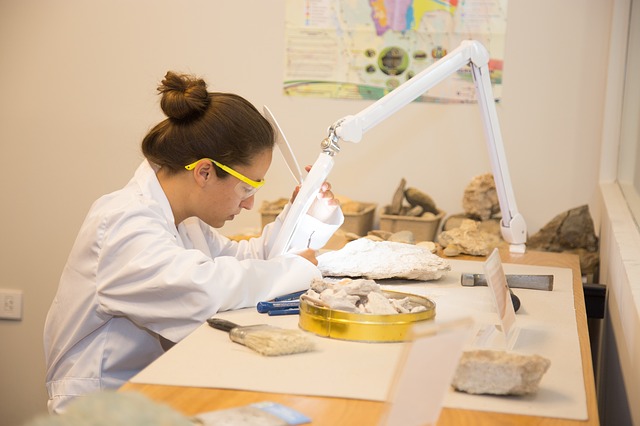
image via: maxpixel.net
It may surprise many to learn that there are many fields in the realm of criminal justice outside of law enforcement and private investigation. The area of forensics has grown more popular as a career in recent decades, in part because of increased visibility in the media, but also because students and others looking for a career change may be interested in a career that combines the natural sciences with criminal justice. The Forensic scientist salary reflects this quality of the career as one that straddles to different areas of specialty.
Men and women in the forensics arena study physical evidence in order to provide analysis and reach conclusions, and it should not be surprising that people trained in this area can provide an invaluable service in the realm of criminal justice. Techniques that allow law enforcement, the government, and others to analyze physical evidence have become more advanced and will continue to do so in coming years. Positions in forensic science are expected to grow much faster than the average, and if the forensic scientist salary keeps pace with this trend, potential workers have much to look forward to.
JOB RESPONSIBILITIES

image via Pexels
Because of the many jurisdictions within the United States, not to mention the many levels of government that are involved in investigation and dispensation of justice, there are many open doors available to anyone interested in a career as a forensic scientist. The FBI alone has numerous positions available for men and women interested in this area, and they are merely one of many federal government agencies that hire investigators. Some positions that the FBI has available for individuals trained in this field include:
As you can probably tell from the list, most forensic scientists have a background in the hard sciences, like biology, geology, or chemistry, and the forensic scientist salary does overlap somewhat with the salaries of scientists working exclusively in those areas. One advantage of pursuing a career in forensic science, for some, will be the ability to apply a natural science background to real work applications, like analyzing evidence found at a crime scene or accident site.
A question that naturally comes up when choosing a career, besides how much does it pay, is what does a worker in this field do exactly. Gaining a full understanding of the ins and outs of the forensic scientist’s work requires that we first understand what they are and what they do. This, of course, requires that we tease out this career from other similar careers that may overlap somewhat with the forensic scientists, like various types of technicians that work in the realm of forensic science or criminal justice.

image via Pixabay
The Forensic scientist works both in the field and in the laboratory to collect and analyze physical evidence to aid law enforcement in investigations and the court system in their proceedings. Forensic scientists play a critical role in the day-to-day work of law enforcement as well as the courts, as physical evidence is often used by judges and juries to establish the innocence or guilt of the accused. In this way, the forensic scientist plays a role in government law and order, while also helping the innocent establish their innocence, at least from their behind-the-scenes locales.
The duties of the forensic scientist are naturally varied, and the forensic scientist salary will be influenced by the type of employer they work for, whether the federal government, local government, university, or another employer, as well as the nature of the work they do. Perusing the list of the jobs offered at the Federal Bureau of Investigation should make it clear to the reader that forensic scientists may be involved in geology work or document analysis, or in the highly specialized area of DNA analysis.
Other factors that influence the forensic scientist salary include variables like location, years of experience, and area of specialized study, which does bear a lot of similarity to other fields in the sciences, which are also influenced by these variables. It is not easy to provide a list of the duties of a forensic scientist, as they are highly varied, but some common areas in which these scientists may find themselves involved include the following:

image via Pexels
This is just a few of the tasks or areas that a forensic scientist may be called to work in, and, in reality, the arena of forensics is as wide as is the physical evidence that they study. In short, any sort of evidence that can be found at the scene of an investigation, be it a bloody coat, a bullet hole, a burned-out computer, a footprint, or a broken mirror, can require a forensic scientist to analyze it, and that list does not even include all the places where DNA evidence can be found.
The career outlook for the forensic scientist is extremely positive, which will be discussed in a later section. Jobs in this industry are expected to grow significantly faster than the national average according to the Bureau of Labor Statistics. This means that in addition to the many areas where a forensic scientist can currently expect to find work, they may be able to branch out even further. Forensic scientists currently work at all levels of the government, and some also work in private forensic laboratories.
The forensic scientist salary, as mentioned previously, will be impacted by work site, but also by experience, area of specialty, and any specialized training the scientist has, just to name a few. Although it is not simple to state why this career is expected to grow so much, by nearly 30% in the next decade, this growth may represent an expansion in the number of government jobs or a historic shortage of professionals in this area that is being remedied by increasing the number of jobs.
EDUCATION REQUIREMENTS
Like many other technical fields that require a background in science, the basic requirement for work as a forensic scientist is a bachelor’s degree. This ensures that the scientist has a foundation in the natural sciences and analytical thinking that allows him or her to complete their work whether they are employed by local law enforcement, the federal government, or in a private laboratory. Because of the highly specialized nature of this injury, many open positions will expect an advanced degree or other specialized training.
As an example, some positions within the FBI require the applicant to have a master’s degree or a certain number of years of training in a specialized field. The forensic scientist salary will be discussed in the next section, but salary expectations are highly influenced by the level of degree the scientist holds as well as any specialized training or experience that he or she has. Indeed, in government work, possession of an advanced degree can often be substituted by a certain number of years’ experience.
One aspect of this profession that becomes immediately apparent is that these factors of training and experience are often the primary dictates of finding work in this field, which is characteristic of professions where there may be a shortage of professionals. Forensic scientists, in short, typically have a bachelor’s degree in the natural sciences combined with some degree of training in criminal justice or analysis. Though many forensic scientists do possess advanced degrees and these may be useful in highly specialized areas, jobs with the government often allow your experience to be a substitute for education.

image via Pexels
Education does play a role in the forensic scientist salary, but it is not the determining factor. As mentioned above, other factors like geographic location and experience seem to be more important.
FORENSIC SCIENTIST SALARY
Considering the varied work that a forensic scientist can be involved in, it should not be surprising that the salary of the forensic scientist varies quite a bit, too. According to the Bureau of Labor Statistics, the forensic scientist salary range is between $ and $$, representing the middle 80% of professionals in this industry. Some positions pay well into the six-figure range, with a position as a forensic research biologist at the FBI paying as much as $$$, according to the BLS.
Job growth in this career is expected to be 27% between 2014 and 2024. It is expected that there will be greater job growth in more populated geographic areas, which are also associated with a higher forensic scientist salary.

image via Pexels
CONCLUSION
With predicted job growth nearly three times the national average and a slew of opportunities to work in an interesting and exciting field, there should be no shortage of men and women pursuing a career as a forensic scientist. Workers in this field often are employed by the government or local law enforcement though they can work in other locations. The forensic scientist salary is highly variable and is primarily influenced by years of experience and possession of specialized training.
Leave a Reply